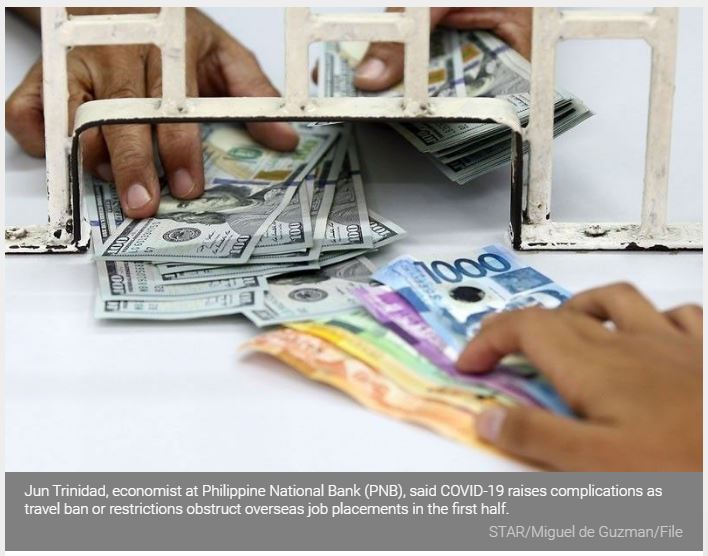Philippines: COVID-19 seen as drag to remittance growth
MANILA, Philippines — The global outbreak of the coronavirus disease 2019 (COVID-19) would affect remittances from overseas Filipino workers (OFWs) this year amid travel bans and restrictions, economists said.
Jun Trinidad, economist at Philippine National Bank (PNB), said COVID-19 raises complications as travel ban or restrictions obstruct overseas job placements in the first half.
“We think remittances this year can rise by two to three percent but with downside risk,” he said.
Trinidad said deployment of OFWs in the Asian labor markets would be affected in the first half of the year, while raising the possibility of returning Filipino workers in countries affected by COVID-19.
Latest data from the Bangko Sentral ng Pilipinas (BSP) showed personal remittances, consisting of cash and non-cash items that flow through both formal or via electronic wire and informal channels such as money or goods carried across borders increased by 3.9 percent to a record high of $33.47 billion from $32.21 billion.
For 2020, BSP sees OFW remittances growing by three percent.
The COVID-19 outbreak has forced government to lower its growth projection for OFW remittances but Malacañang insisted that the impact would just be “minimal.”
Citing labor department assumptions, Cabinet Secretary Karlo Nograles said the COVID-19 outbreak could dampen this year’s total cash remittance growth by 0.8 percentage point from three percent to 2.2 percent.
“While OFW remittances reached a record high of $33.5 billion last 2019, we were expecting this to increase to $34.5 billion this year with a projected growth rate of three percent,” Nograles said at a press briefing yesterday.
“But because of this COVID-19 epidemic, we have adjusted our growth projections to 2.2 percent and now expect $34.2 billion in remittances for 2020,” he added.
Despite the lower growth projection, Nograles said the amount of OFW remittances is still expected to reach a new record high this year.
He also noted that mainland China, where the virus originated, accounts for only 0.1 percent of total OFW remittances while its administrative regions Macau and Hong Kong account for 0.4 percent, and 2.7 percent, respectively.
Trinidad said the peso would likely weaken to a range of 52 to 53 per $1 in the third quarter as the country’s current account (CA) position would revert to a deficit equivalent to two percent of gross domestic product (GDP) on upbeat investment demand and construction prospects.
Metrobank research analyst Pauline Revillas said OFW remittances account for nine percent of the country’s domestic output as measured by the GDP.
“Remittances are an important source of income for many Filipino families and this constitute one of the main drivers of consumer spending,” she said.
Revillas said remittances and earnings of the business process outsourcing (BPO) sector present a steady flow of foreign exchange to help reduce the country’s CA deficit.
“A key risk to remittance flows this year will be the impact of COVID-19 on industries and countries where our OFWs are currently deployed,” Revillas said.
Ruben Carlo Asuncion, chief economist at Union Bank, said the COVID-19 outbreak may pose a challenge to remittance inflows that is expected to grow by at least four percent this year.
However, Asuncion said the impact may be minimal as the share of China remittance inflows is relatively small compared to other source countries such as the US and Saudi Arabia.
He said the biggest downside would be the decline of inflows coming from Singapore that has a significant share among host countries.
“The risk of the COVID-19 outbreak becoming a pandemic and affecting economies outside of China and the lurking geopolitical risks that can undermine Middle East stability and peace at any moment are very high on the horizon,” Asuncion said. – With Alexis Romero
Source: https://www.philstar.com/business/2020/02/25/1995759/covid-19-seen-drag-remittance-growth


 Thailand
Thailand




